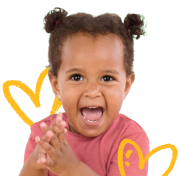
Many researchers are highlighting the impact of a search-based culture on our ability to retain information in our brain. We no longer know phone numbers but instead, we rely on our trusty smart phones; basic recipes are now stored in the cloud and no longer in our heart and mind. Our little ones will grow surrounded by these technologies and as parents we are likely to minimize the importance of unsupported recollection. During infancy, toddlerhood and preschool years we have an outstanding window of opportunity to teach our little ones how to learn. The fact is, they cannot yet Google therefore they are dependent on more traditional tools of recollection such as association and raw memorization.
Music & Song
From birth we are musical and have a tendency to respond to rhythm and patterns. Take advantage of this by using valuable lyrics in the songs your child learns. From geography to science and civics songs have a way of staying with us for a lifetime.
Competitive Learning
Reward your child with praise and make learning a game. If you have a larger family allow for some healthy competition and play games of association. As your toddler begins learning letters they will be able to recognize letters in street signs or in the supermarket.
Flash Cards
When we came up with our baby sign language flash cards we did it with the knowledge that we learn by visual association. Create sets of flash cards using things meaningful and relevant to your child and help them connect the dots. For example, you could use a set of cards showing maps of different countries and help your child learn the capital for each.
Hands-on
To date I am able to tie a number of nautical knots. This is a skill I learned before my fourth birthday. Allowing a child to experience tactile three-dimensional feedback often results in effective recollection of the task learned.
Before your little one learns how to Google take time to encourage retention, learning and discovery. A good foundation in these three areas will make a significant difference in how you child processes information as an adult and it will help in transitioning from raw memorization into analytical and creative thinking.




